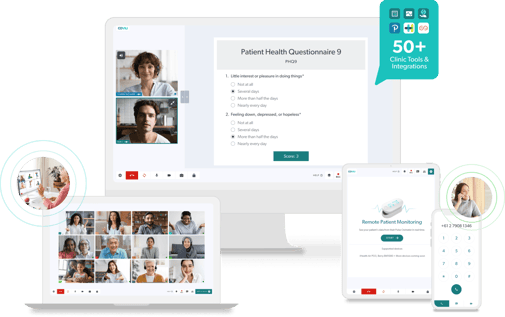Telehealth Across State Lines
Telehealth overcomes barriers of distance, making it theoretically possible for a provider in Connecticut to provide care to a patient in California.
But does the law now allow that? US healthcare regulation is complex, primarily state-based, and varies depending on the provider and the service in question.
And widespread telehealth was, after all, created as an emergency response to a global pandemic. As the National Law Review notes,
In the face of quarantine requirements, travel restrictions, and a renewed emphasis on alternative care models intended to prevent the spread of COVID-19, in the early part of the pandemic many states relaxed or waived in-state licensure requirements, or otherwise granted temporary licenses to out-of-state practitioners.
These allowed health care providers to more readily provide telehealth services to patients originating in a state other than where the health care provider was located and licensed, extending access to care in much-needed ways when most in-person non-emergent care was significantly reduced nationwide.
When their public health declarations expired in 2021, some states also allowed their broad licensure waivers to lapse, meaning that out-of-state telehealth practitioners could no longer provide care to in-state patients.

Other states were more forward-looking, realizing that telehealth was more than a band-aid for the pandemic. As the National Law Review notes,
…propelled by the flexibility and desirability of remote care for some conditions as well as patient and provider willingness to embrace alternative care models, these states are making permanent changes that will make it easier for out-of-state health care providers to practice telehealth across state lines…We expect to see this trend of expanded access continuing.
So, where do things stand today?
Can you legally provide telehealth across state lines?
Yes, there is high-level permission to provide telehealth across state lines – but the devil is in the detail. The US government advises that ‘Providers can deliver telehealth services across state lines, depending on rules set by state and federal policies.’
What do the states say?
Though telehealth obviously takes place virtually, it is officially considered to occur at the patient’s physical location, meaning that the provider usually needs to be licensed in the patient’s home state.
As the Center for Connected Health Policy explains,
A few states have licenses or telehealth-specific exceptions that allow an out-of-state provider to render services via telemedicine in a state where they are not located, or allow a clinician to provide services via telehealth in a state if certain conditions are met (such as agreeing that they will not open an office in that state). Still, other states have laws that don’t specifically address telehealth and/or telemedicine licensing but make allowances for practicing in contiguous states, or in certain situations where a temporary license might be issued provided the specific state’s licensing conditions are met.
That means that the answer to whether or not you can provide telehealth across state lines depends on the states in question. It’s likely that you will need to gain the appropriate registration in each state where your patients (or potential patients) live.
The Center for Connected Health Policy maintains an up-to-date list of the relevant regulations in each state. Explore their interactive map here.

What kind of services can be provided across state lines?
Again, this varies immensely from state to state. There’s a long and varied list of professionals who can gain cross-state licensing for telehealth in different states, including:
- Doctors
- Speech and language pathologists
- Audiologists
- Dentists
- Nurses
- Optometrists
- Psychologists
- Physical therapists
- Alcohol and drug counselors.
Again, the best place to find precise information is the Center for Connected Health Policy’s interactive map.

How complicated is it to provide telehealth across state lines?
If the thought of gaining registration in multiple states makes you groan inwardly, then perhaps begin with neighboring states. That will give you an opportunity to connect with patients who may live relatively near to your practice, especially if you’re near a border town.
Once you’re registered in a neighboring state, you can begin to market your services to more patients in that state. And, if you’ve found the whole thing easier than expected, you can begin gaining registration in other states too.
Is it worth the effort? It will depend on your goals. Telehealth is certainly worth it if you want to:
- Reach more patients, irrespective of distance
- Provide care in under-serviced areas
- Increase your practice revenue
- Position your practice for the future.

How Coviu can help
Gaining cross-state licensing is only one part of providing interstate telehealth, of course. The other part is ensuring you have the right telehealth platform on which to run your service.
Coviu is a leading All-In-One Virtual Care Engagement Platform that makes it easy for you to provide an efficient and profitable telehealth service.
Coviu enables you to:
- Conduct video and phone consultations
- Integrate your telehealth service with other practice programs
- Comply with HIPAA requirements
- Access various clinical assessments or tools tailored to your specialty – medical, manual therapy, speech therapy, or mental health care
- Keep sensitive data safe through end-to-end encryption
- Take pre-call and in-call payments
- Get started quickly and easily.

The best way to learn about Coviu is to try it. That’s why we offer a free, no-obligation trial for four weeks (we don’t even take credit card details).
So, if you’d like to provide telehealth care across state lines and boost your practice at the same time, start your free trial today.
Disclaimer: All information is general in nature. Patients should consider their own personal circumstances.





